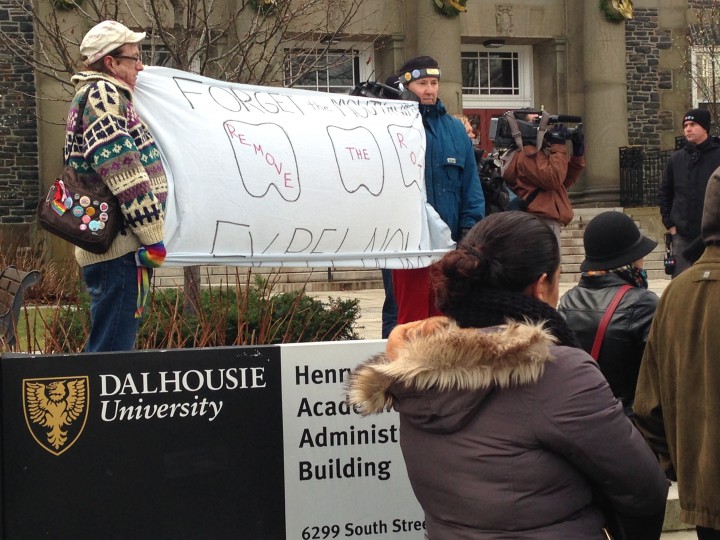Watch above: Dalhousie University President Richard Florizone announces the suspension of 13 dentistry students

TORONTO – Dalhousie University announced the suspension of 13 fourth-year dentistry students from clinical activity on Monday–almost three weeks since female students first came forward with complaints of abusive comments published on social media. Dalhousie’s president said the university is following procedures consistent with both the law and university policy, and emphasized that the complainants are currently part of a confidential restorative justice process which they chose (the other option would have been filing a formal complaint).
Restorative justice is a process by which the victims, perpetrators, and university staff work together to discuss the harm done by the offence (in this case sexually violent and abusive comments) and what the appropriate consequences should be to make things right and rebuild trust. The idea is that there will be acknowledgement of responsibility and apology, a chance for victims to ask questions of the offenders and express the harm done, and efforts to provide healing and reintegration of offenders into their communities. Unlike the more formal process where victims may be limited to a victim impact statement, they’re involved in the process throughout and invited to discuss the case with offenders and members of the community.
Though championed in a recent report by Vancouver lawyer Geoffrey Cowper, who urged increased use of the process as one of his recommendations in the overhaul of the British Columbia justice system, critics worry there won’t be real consequences for the perpetrators in the dentistry scandal.
READ MORE: Dalhousie restorative justice response to Facebook comments spurs #DalhousieHatesWomen hashtag
The “Class of 2015 DDS Gentlemen’s Club” Facebook page has since been deleted, but screenshots obtained by CBC News depict posts that Dalhousie President Richard Florizone called “offensive, degrading to women and unacceptable” in Monday’s press conference. The screenshots show a poll where members were asked which of their female classmates they would “hate f–k” and jokes about using chloroform on women.
The decision to defer the public announcement of the 13 students’ suspension was made because of “credible reports of potential self-harm from our frontline staff” from the male offenders, said Florizone on Monday. He added the school wanted the male students to be in Halifax at the time of the announcement so they could access professional counselling services if needed.
Watch below: Concern for student safety forced Dalhousie to delay announcement
Those male students are likely feeling “incredibly shameful,” according to Brenda Morrison, the director for the Centre for Restorative Justice at Simon Fraser University’s school of criminology.
“When I put myself in their place–the shame they have brought upon themselves and their family at this stage of their career–I mean it’s the top students that get into professional degrees like dentistry,” she said. “So I imagine they’re feeling extremely vulnerable at this point in time.”
But a certain kind of shaming, called reintegrative shaming, is one of the concepts of restorative justice. This is different from so-called stigmatized shaming, where Morrison says we confound the person with the behaviour and then exclude them from the community. (She adds this is what happens in our current court system and other punitive processes).
Reintegrative shaming, however, involves separating the behaviour from the person, allowing the person to take responsibility for the behaviour.
“When you conflate the two, the person thinks of themselves as a bad person. It’s hard to get out of that cycle.”
Morrison believes restorative justice is the only way to address the problem systematically and hear from those affected. She said fears that the perpetrators won’t face real consequences may stem from a lack of knowledge about the process itself, and cites British studies that show how effective and healing it can be for all parties involved.
“In randomized control trials in England for serious crimes such as murder, the offenders got the serious sanction–prison in this case–but were also offered the restorative justice process,” she said. “When they got both, recidivism rates went down.”
READ MORE: Dalhousie president hopes restorative justice will rebuild trust in classroom
Morrison said offenders had an opportunity to take full responsibility in dialogue with the victims, and victims had more confidence in the justice system. She said they were less likely to seek revenge for the harms done and that PTSD was experienced significantly less when they had an opportunity to have a voice in the process. She said victims get a lot out of restorative justice cases regardless of the type of offence, and get answers to questions such as “Why me?” that wouldn’t be possible in the criminal justice system.
In a U.S. report on restorative processes, sociology professor David Karp compared restorative justice processes with a “model code administrative board hearing” and found restorative justice practices were rated highest across all areas measured, with the biggest difference in ability to effectively communicate face-to-face under difficult circumstances.
Dalhousie law professor Wayne MacKay, who authored the 2013 report on sexism at St. Mary’s University in Halifax following the frosh rape chants in Sept. 2013, agreed limited public awareness around restorative justice could be part of the reason why some people are upset about Dalhousie embracing the process.
“People don’t recognize that restorative approaches can produce quite significant sanctions and quite significant accountability,” said MacKay in a past interview. “And I think that will be the real test – what comes out of it at the end of the day.”
The university wouldn’t give details on what, if any, part of the process would be made public, but the president said an update would be provided by the end of January 2015.
Watch below: Dalhousie officials explain rules around student suspension
With a file from Marieke Walsh


Comments